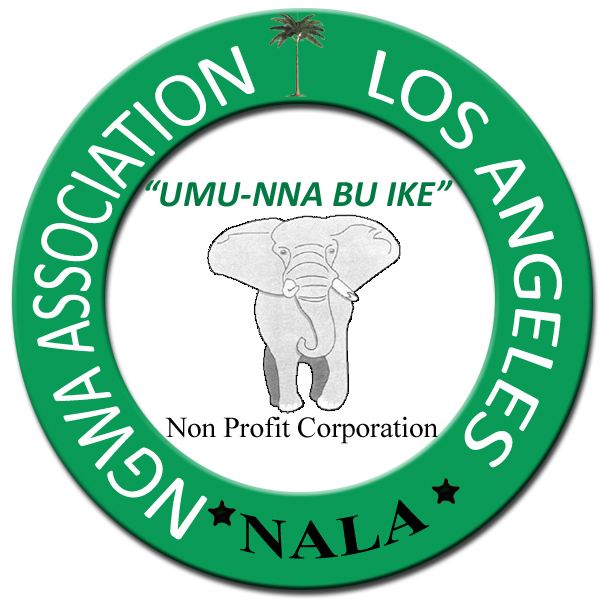Our History
Ngwa Association Los Angeles (NALA) Inc. is a non-profit organization of the Ngwa people ( Ngwas) of Abia State of Nigeria, residing in the Southern California region, United States of America. The association's primary goal is to unite all Ngwas in the area, promote Ngwa traditions and culture, provide a community environment which will enable all Ngwa people advance intellectually, socially and economically.
The Ngwa People
In the absence of a documented account of the origin of the word ‘Ngwa’ in the pre-colonial era, one source of information appears to be the book written a few years ago by a prominent historian and archivist, Mr. J.E.N. Nwaguru. His proximity to the national archives in Enugu, Nigeria made his work an acceptable source of information. Another source would be the fireside evening stories from our grandfathers. This oral history account has it that the word ‘Ngwa’ was a short form of the Igbo adjective “Ngwa-Ngwa” meaning “quickly”.
Geographical Setting
The area covering the old Aba Ngwa division is situated in the tropical rain forest of southern Igbo plain in the present Abia State of Nigeria. It has a population of about one million people and an area of little over nine hundred square miles. The area is bounded on the north by the present Umuahia zone, on the west by Owerri and Mbaise, on the east by Ikot-Ekpene and Abak and on the south by Ukwa. The important waterways are the Imo River to the south and west, the Aba or Aza River that rises at Abayi, and flows south through Aba Township into the Imo River at a point near Okpontu. Around Nsulu to the northeast, there are two minor rivers, the Otamiri and the Ohi. At no point does the land rise above an elevation of 50ft.
The people are largely farmers, producing yams, cassava, cocoyam, maize and other tropical farm products. Major rural industries include garri and palm produce in addition to Akwete cloth weaving in which most women from the area were engaged. The old divisional headquarters was Aba, a very important commercial and industrial center. Major population concentration includes Aba, Mgboko, Osisioma, Umooba, Owerinta, Nbawsi and Okpu-Alangwa.
Origins and Waves of Migrations
The Ngwas, the main body of the Ngwa clan is said to have originated from a village called Umunoha in the present Owerri zone of Imo State Nigeria. Traditional tales stated that people of Umunoha village had taken a journey in search of new lands in which to dwell, the journey lasted many days and the group finally arrived at the banks of the great Imo-River. Tired, the group decided to stop by the Imo river bank to find food to eat. The only handy food item was yam. One group felt it would be quicker to roast the yams, while the other group preferred boiling the yams. As soon as they started cooking the food, the stream began to rise.
Three of the traveling brothers who boiled their yams, hurriedly ate the food, packed up their belongings and crossed over to the other side of the river, leaving their kit and kin behind who had decided to roast their yams. Shortly after the brothers crossed, the river overflowed making it hard to cross. Their kins who roasted their yams were not able to get across the river. The three brothers who crossed to the other side of the river were Ukwu, Nwoha ad Avosi in order of age. They were given the name ‘Ngwa’ on account of the expeditious manner of their crossing, while the stragglers on the right bank were named ‘Ohuhu’. Till this day, all towns and villages on the other side of Imo-River are referred to as ‘Ndi-Ohuhu’ or ‘Umu-Ohuhu’.
The villages of the left bank of the Imo river were inhabited by the Ibibios, who received Ngwa Ukwu and his brothers amicably allocating to them sufficient virgin lands for their immediate needs. Ngwaukwu settled at what is now the village of Umuolike where he also established his ancestral shrine. The capital of Ngwa-land is ‘Okpu-Ala Ngwa’.
For many years, the three brothers dwelt around Okpu-Ala Ngwa in peace, but as their families increased in number, they moved apart in different directions. Ngwaukwu group, Mbutu, Ovuokwu and Ovungwu, and Avosi found the villages of Nvosi and all around Okpu-Ala Ngwa. According to the historical account, Mr. J. E. N. Nwaguru, the origins of Ntigha and Nsulu is a bit controversial. Some say that the Ntigha crossed over from Ohuhu with Ngwaukwu and his brothers, while others say that Ntigha was the son of Ngwaukwu.
Whichever is the case, Ntigha settled at Umunachi and established the ala-Ntigha deity, while Nsulu took part of the Juju to settle at Eziala and adjoining villages. From these early settlements, the Ngwas advanced to the southwest, which include Oza, Obegu, Okporo-Ahaba, Osokwa, Arongwa, Amavo, Ngwaobi, and Amaise, and to the southeast which also includes Aba-na-Ohazu, Akuma-Imo, Ahiaba-na-Abayi, Ibeme, Mgboko-Umuanunu, Mgboko-Amairi, Mgboko-Itungwa, Mbutu-Umuojima, Ndiokata, Ohanze, Ugwanagbo and Uratta.
 NGWA ASSOCIATION LOS ANGELES
NGWA ASSOCIATION LOS ANGELES